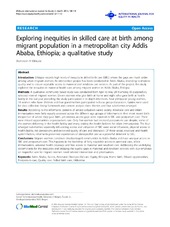| dc.contributor.author | Mirkuzie, Alemnesh Hailemariam | en_US |
| dc.date.accessioned | 2014-12-09T15:15:45Z | |
| dc.date.available | 2014-12-09T15:15:45Z | |
| dc.date.issued | 2014-11-25 | eng |
| dc.identifier.issn | 1475-9276 | |
| dc.identifier.uri | https://hdl.handle.net/1956/8862 | |
| dc.description.abstract | Introduction: Ethiopia records high levels of inequity in skilled birth care (SBC), where the gaps are much wider among urban migrant women. An intervention project has been conducted in Addis Ababa, intending to improve quality and to ensure equitable access to maternal and newborn care services. As part of the project, this study explored the inequities in maternal health care among migrant women in Addis Ababa, Ethiopia. Methods: A qualitative community based study was conducted from April to May 2014 among 45 purposefully selected internal migrant women. Eleven women who give birth at home and eight who gave birth at health facility in the last year preceding the study participated in in-depth interviews. Four primiparas’ young women, 18 women who have children and four grandmothers participated in focus group discussions. Guides were used for data collection. Using framework and content analysis three themes and four sub-themes emerged. Results: According to the informants, patterns of service utilization varied widely. Antenatal care and infant immunization were fairly equally accessed across the different age groups of informants in their most recent birth irrespective of where they gave birth, yet obvious access gaps were reported in SBC and postpartum care. There were missed opportunities to postpartum care. Only few women had received postpartum care despite, some of the women delivering in the health facility and many visiting the health facilities for infant immunization. The four emerged sub-themes reportedly influencing access and utilization of SBC were social influences, physical access to health facility, risk perceptions and perceived quality of care and disrespect. Of these social, structural and health system factors, informants presented experiences of disrespectful care as a powerful deterrent to SBC. Conclusions: Migrant women constitute disadvantaged communities in Addis Ababa and have unequal access to SBC and postpartum care. This happens in the backdrop of fairly equitable access to antenatal care, infant immunization, universal health coverage and free access to maternal and newborn care. Addressing the underlying determinants for the inequities and bridging the quality gaps in maternal and newborn services with due emphasis on respectful care for migrant women need tailored intervention and prioritization. | en_US |
| dc.language.iso | eng | eng |
| dc.publisher | BioMed Central | eng |
| dc.rights | Attribution CC BY | eng |
| dc.rights.uri | http://creativecommons.org/licenses/by/4.0 | eng |
| dc.subject | Addis Ababa | eng |
| dc.subject | Access | eng |
| dc.subject | Antenatal | eng |
| dc.subject | Disrespectful care | eng |
| dc.subject | Equity | eng |
| dc.subject | Ethiopia | eng |
| dc.subject | Home birth | eng |
| dc.subject | Missed opportunities | eng |
| dc.subject | Postpartum care | eng |
| dc.subject | Quality care | eng |
| dc.subject | Skilled birth care | eng |
| dc.subject | Utilization | eng |
| dc.title | Exploring inequities in skilled care at birth among migrant population in a metropolitan city Addis Ababa, Ethiopia; a qualitative study | en_US |
| dc.type | Peer reviewed | |
| dc.type | Journal article | |
| dc.date.updated | 2014-11-27T16:04:41Z | |
| dc.description.version | publishedVersion | en_US |
| dc.rights.holder | Copyright 2014 Mirkuzie; licensee BioMed Central Ltd | |
| dc.rights.holder | Alemnesh H Mirkuzie et al.; licensee BioMed Central Ltd. | |
| dc.source.articlenumber | 110 | |
| dc.identifier.doi | https://doi.org/10.1186/s12939-014-0110-6 | |
| dc.source.journal | International Journal for Equity in Health | |
| dc.source.40 | 13 | |


